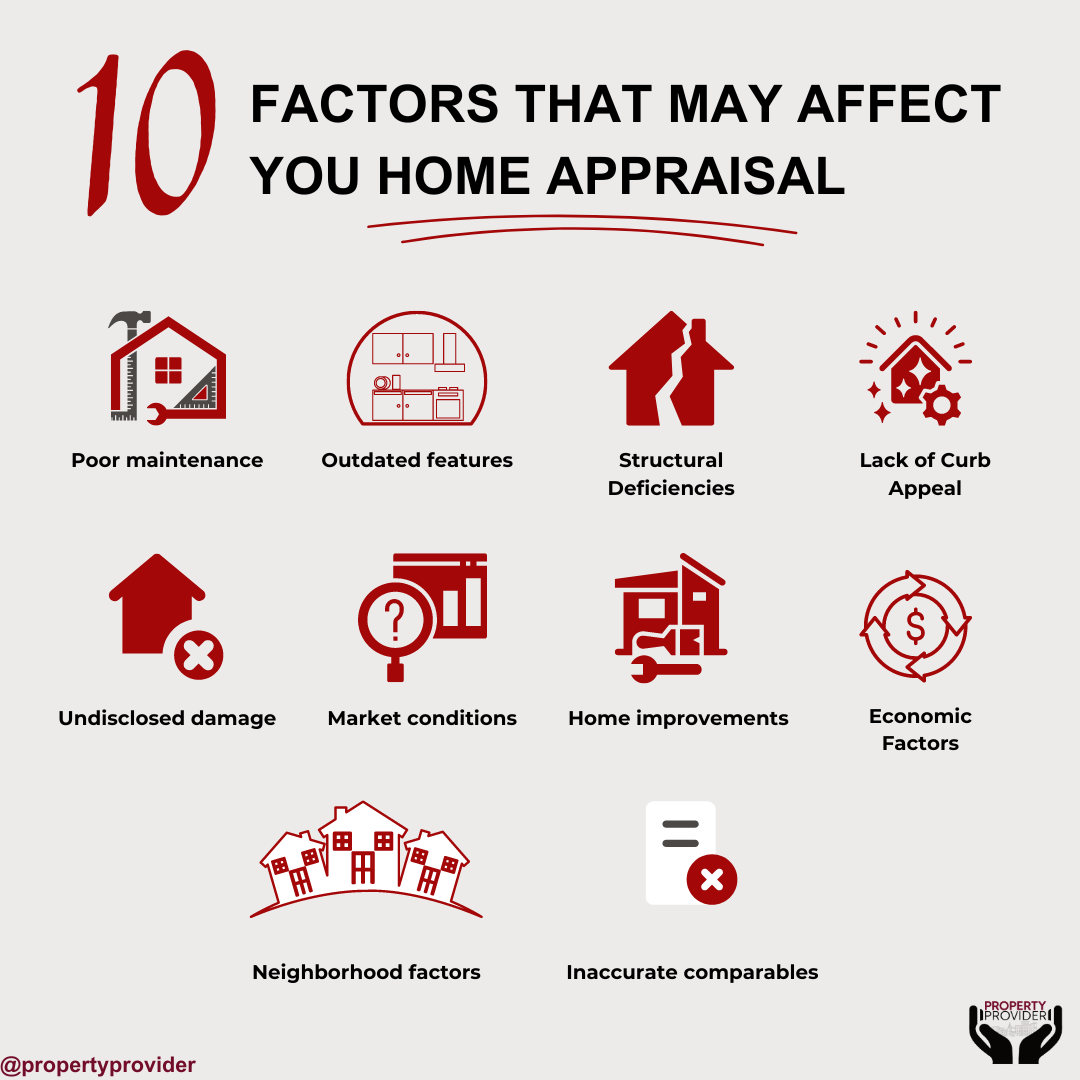
What Hurts A Home Appraisal And How To Overcome It
When it comes to selling or refinancing your home, one crucial aspect that often goes overlooked is the home appraisal. A fair and accurate appraisal is essential for determining the property’s market value, affecting both buyers and sellers. In this blog, we’ll delve into the factors that can negatively impact a home appraisal and explore ways to address them. Together, let’s answer the question, “What hurts a home appraisal.”
Why Does it Matter?
Understanding what hurts a home appraisal is vital because it directly influences the value assigned to your property. A lower appraisal than expected can lead to financial implications for both buyers and sellers. It can affect the financing options available to buyers and impact the overall sale or refinancing process. Being aware of potential pitfalls allows homeowners to take proactive measures to enhance their property’s value.
What Do Appraisers Look For?
Typically, appraisers adhere to the guidelines outlined in the Uniform Residential Appraisal Report, which is a standardized document facilitating the assessment of a property’s attributes by appraisers.
This report classifies an appraiser’s analysis into key areas such as neighborhood, site, and improvements. The following outlines some primary sections that appraisers will review and provide commentary on within their reports.
1. Condition of the Property
- Is the property well-maintained, or are there visible signs of neglect?
- Are there any structural issues, such as a leaky roof, plumbing problems, or peeling paint?
2. Location
- What is the overall appeal and safety of the neighborhood?
- Are there any environmental hazards nearby, such as flood zones or pollution?
3. Size of the Property
- Is the square footage accurately represented?
- Are there any unpermitted additions or renovations that may affect the property's size?
4. Features of the Property
- Are there unique or uncommon features that might impact its value positively or negatively?
- Are the interiors updated with modern fixtures, appliances, and decor?
5. Comparables in the Area
- What are the recent sales of comparable properties in the vicinity?
- How does the property under appraisal compare to others in terms of size, features, and condition?

Find Out What Your House Is Really Worth
Unlike automated valuation, we have a real person sit down and look at all the factors when determining your homes value which in return makes them a lot more accurate.
because we offer: human pricing

What hurts a home appraisal? And why it matters?
What hurts a home appraisal and why it matters? A home appraisal is a crucial step in the home buying and selling process, as it determines the fair market value of a property. This valuation influences mortgage approvals, refinancing options, and negotiations between buyers and sellers.
Here are some key elements that can negatively impact a home’s appraisal:
1. Poor Maintenance
Homeowners, take note – visible signs of neglect, like peeling paint or a leaky roof, can significantly impact your home’s appraisal. Appraisers scrutinize every detail, and a lack of proper maintenance sends a signal of depreciation. To boost your property’s value, address these issues head-on. Invest in repairs and renovations to showcase a well-maintained home, ultimately improving its perceived worth. Don’t let deferred maintenance be the reason your appraisal falls short.
When it comes to the interior, fix any broken fixtures or appliances promptly. A well-maintained home gives a positive impression, ensuring the appraiser sees your property in its best light. Remember, a stitch in time saves nine – proactively managing maintenance can be the key to a successful appraisal.
2. Outdated Features
In the fast-paced world of real estate, outdated features can be a deal-breaker for appraisers. Old fixtures and design elements scream ‘last century,’ affecting your property’s perceived value. Stay ahead by investing in modern amenities and decor. Upgrading your home to contemporary standards not only enhances its appeal but also boosts its appraisal value.
Consider the kitchen and bathroom – two areas that can make or break an appraisal. If your home still sports avocado-green appliances or shag carpets, it’s time for a change. Bring in sleek, modern designs to create a favorable impression. Remember, the goal is to make your home feel current and desirable in the eyes of the appraiser and potential buyers.
3. Structural Deficiencies
A strong foundation is not just essential for a home but also for a positive appraisal. Appraisers closely examine structural aspects, and any cracks, water damage, or faulty wiring can send the value plummeting. Don’t let structural deficiencies become the Achilles’ heel of your appraisal. Prioritize inspections and invest in necessary repairs to ensure your home stands tall and strong.
For potential sellers, addressing structural issues early on not only prevents a decrease in appraisal value but also builds confidence with prospective buyers. Keep in mind that appraisers appreciate a solid, well-maintained structure, contributing to a higher overall property value. Being proactive about structural integrity is a smart move in the real estate game.
4. Lack of Curb Appeal
They say first impressions matter, and in real estate, this couldn’t be truer. Appraisers take note of a property’s exterior – overgrown landscaping, a cluttered yard, or peeling paint can diminish curb appeal, affecting the overall appraisal. To ensure your home makes a striking first impression, invest in enhancing its curb appeal.
Simple fixes like a fresh coat of paint, well-maintained landscaping, and a tidy exterior can significantly impact how your property is perceived. Curb appeal not only influences the appraisal but also attracts potential buyers. Remember, the exterior is the face of your home, so make it inviting and appealing to leave a lasting impression on appraisers and buyers alike.
5. Undisclosed Damage
Honesty is the best policy, especially when it comes to home appraisals. Concealing damage or problems with the property may seem tempting, but it can lead to severe repercussions during the appraisal process. Full disclosure of any known issues allows both parties to address them proactively, minimizing surprises and ensuring a fair appraisal.
Sellers, take the high road – disclose any damage or issues with your property upfront. This transparency not only builds trust but also provides an opportunity to resolve potential appraisal challenges before they become deal-breakers. Appraisers appreciate openness, and it can contribute to a smoother appraisal process for all parties involved.
Buying & Selling Has Never Been So Simple
Now, everything you need to successfully buy or sell your home is on one platform.
How Can We Help You?
Answer a few quick questions to see how we can help you.
6. Market Conditions
Real estate is influenced by market conditions, and these fluctuations can impact appraisal values. A declining market or oversupply of similar properties may result in lower appraisals, while a competitive market could drive prices higher. Stay informed about the current market conditions in your area to anticipate how they might affect your home’s appraisal.
Buyers and sellers alike should be aware of market trends to make informed decisions. In a buyer’s market, where supply exceeds demand, appraisers may lean towards lower values. Conversely, in a seller’s market, where demand outstrips supply, appraisals may trend higher. Adapting your strategy based on market conditions can help you navigate the appraisal process more effectively.
7. Home Improvements
While home improvements can add value, not all upgrades guarantee a higher appraisal. Over-improving a property or investing in upgrades that don’t align with the local market can result in diminished returns during the appraisal process. Sellers should be strategic in their home improvement projects, focusing on upgrades that appeal to the broader market.
Prioritize improvements that offer a strong return on investment, such as kitchen and bathroom upgrades or energy-efficient features. Consult with your real estate agent to understand which improvements are likely to have the most significant impact on your home’s appraisal value. Being strategic with home improvements ensures you get the most value for your investment.
8. Economic Factors
Economic factors can have a ripple effect on property values. Downturns, job losses, or local industry closures can negatively impact specific areas, leading to lower home appraisal values. While homeowners have limited control over broader economic conditions, staying informed about local economic trends can help you anticipate potential impacts on your property’s value.
Buyers and sellers should be mindful of economic factors when entering the real estate market. In economically challenging times, sellers may need to adjust their expectations, while buyers may find opportunities in a buyer’s market. Collaborating with a knowledgeable real estate agent who understands the local economic landscape can provide valuable insights for navigating these challenges.
9. Neighborhood Factors
Your home doesn’t exist in isolation; the neighborhood plays a significant role in its appraisal value. Factors such as crime rates, school quality, and nearby amenities influence the desirability of the area. If your neighborhood has drawbacks, it may affect your home’s appraisal. While you can’t change the neighborhood, being aware of these factors allows you to set realistic expectations and strategize accordingly.
For sellers, emphasizing the positive aspects of your neighborhood can counterbalance potential drawbacks. Highlight nearby amenities, community events, and positive neighborhood trends to provide a comprehensive picture to the appraiser. Understanding the neighborhood’s impact on your home’s value is crucial for navigating the appraisal process successfully.
10. Inaccurate Comparables
Appraisers rely on recent sales data of comparable properties to assess a home’s value. If there are few recent sales or if the comparables used are not truly similar to the subject property, it can lead to an inaccurate appraisal. Sellers should be vigilant about the selection of comparables, ensuring they accurately reflect the features and condition of their home.
Working closely with your real estate agent to provide accurate and relevant comparables is crucial. Agents can assist in selecting appropriate properties that align with the unique characteristics of your home, preventing skewed appraisal values. Ensuring that the comparables are a true reflection of your property helps in presenting a more accurate appraisal to the appraiser.
How to Address Issues and Maximize Appraisal Value
To mitigate factors that hurt a home appraisal, homeowners should focus on proactive measures to enhance their property’s appeal and value. This includes investing in necessary repairs and upgrades, maintaining the home’s condition, and providing accurate information to appraisers.
Collaborating with a knowledgeable real estate agent can also be instrumental in navigating the appraisal process. Realtors can offer valuable insights into local market trends, help homeowners identify areas for improvement, and provide guidance on pricing strategies to maximize appraisal value.
Additionally, real estate agents can assist buyers in identifying potential appraisal issues during the home search process, ensuring they make informed decisions and avoid properties with significant appraisal challenges.
Curious about your Home’s Value?
Get your free home valuation here >> FREE HOME VALUATION
Are you a homeowner looking to sell or a buyer on the hunt for your dream home in Los Angeles? Want to learn more about what hurts a home appraisal? Contact the Property Provider Group today for personalized advice and assistance tailored to your unique needs.
